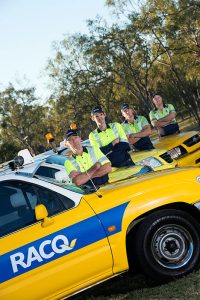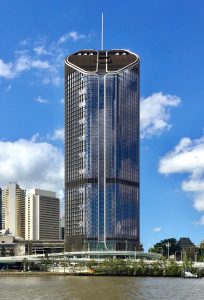Our Clients
At Shape Consulting, we love our clients, they are the heartbeat of what we do and we are excited to help them seize emerging opportunities. Since 1998, we have been the trusted advisor to a range of public and private sector organisations with clients in the water, energy, resources, government, transport, defence, health, construction, manufacturing, not-for-profit and finance sectors. We have also worked with dozens of Australian Local and Regional Councils over the years.
Although our heart and soul is here in Queensland, we’ve also been fortunate to support global organisations as they cope with the dynamic context of today’s world. Working on an international stage provides us with an appreciation and validation of the different cultures and perspectives that exist in the workplace and how we can collaborate better to improve our performance.
We are proud to partner with some of the most respected Queensland organisations.
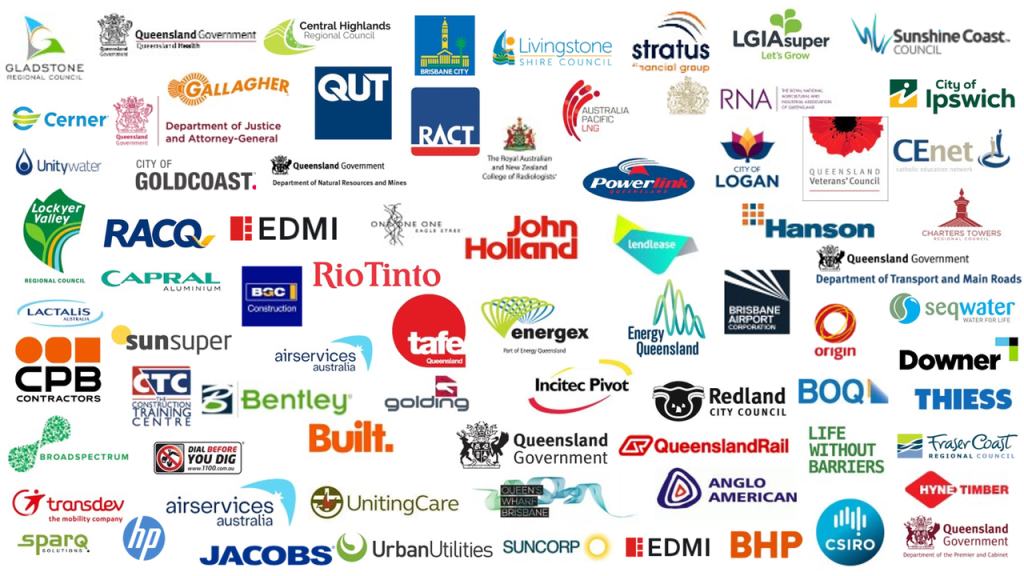
Case Studies
Achievements

Queensland Project of the Year
Australian Institute Project Management
2017

Queensland Organisational – Change Management Project of the Year
Australian Institute Project Management
2017

National Organisational – Change Management Project of the Year
Australian Institute Project Management
2017

Organisational Change Management
Asia-Pacific Federation of Project Management
2017

EDMI
Designing Culture
Shape Consulting is proud of the consulting services and advice we have been able to provide to EDMI since 2010. With humble beginnings in Brendale in north Brisbane the company has expanded to be one of the leading Smart Metering companies in the world – now headquartered in Singapore and owned by Japanese company – Osaki.
Our journey with EDMI started with the use of the Blue Ocean Strategy framework to develop a strategy for the EDMI Australasia business that has offices in Brisbane, Dandenong and Wellington, New Zealand. A graphical representation of the strategy was used to help communicate the plan to the workforce that includes a range of blue collar workers in the workshops in Dandenong.
In the last 11 years this has included:
- Implementation of the Nine Conversations in Leadership© workshops with the full leadership team – across two separate cohorts.
- Using the Life Style Inventory© Human Synergistics tool to provide 360 degree feedback to leaders around their thinking and behaviour. The subsequent coaching has continued for multiple years.
- Facilitation of strategy days, reviews and enhancements to the culture plan.
- Supporting process change initiatives focussed on performance management, logistics and R&D.
- Continued leadership development including use of the Shaping Leaders Digital Learning platform.
- Assistance in evolving the business model towards agile – including the implementation of SaFE 4.0.
- Evolving our services to the global business via support to the Culture Champions Network.
Key Outcomes:
The key outcomes for the business have been enormous with an outstanding growth rate and market share across Australia and especially in New Zealand. At an individual level the team has expressed gratitude at their continued development and evolution as leaders. Retention of key personnel has been a major outcome that has been achieved due to the integrated interventions that we have delivered over time.

POWERLINK
Integrated Consulting Services
Powerlink is a Queensland Government – owned provider of high voltage electricity transmission network services. It provides services to about four million Queenslanders as well as major industrial customers and the state of New South Wales via the Queensland/NSW Interconnector transmission line.
The organisation owns, operates and maintains the transmission network extending 1,700km from north Cairns to the New South Wales border, including 15,337 circuit kilometers of transmission lines and 140 substations.
In 2013, Powerlinks Board, CEO and executive leadership team sought a partner to provide ongoing strategic advice, and organisational and leadership development services. Powerlink acknowledged it was entering a period of change including growing demand for electricity, pressure on electricity prices, growth on renewable energy generation and an ageing transmission infrastructure in Queensland. The organisation needed to navigate these changes and continue to deliver value to stakeholders with a strong, effective leadership team at the helm, and a robust culture throughout Powerlink.
Over five years, Shape Consulting worked with Powerlink’s Board, CEO and executive leadership team on a range of integrated consulting assignments that focused on structural change, organisational cultural enhancements, performance improvement and coaching. This included regular assessments of the organisational culture and performance, and implementation of improvement strategies.
Shape Consulting provided leadership coaching and 360 degree feedback for the executive leadership team along with facilitated workshops to achieve alignment of the leadership approach and strategic direction.
Of all these initiatives, the work on Powerlink’s Maximising Accountabilty and Peformance (MAP) Program from 2014 to 2017 was a highlight. During this period, Shape Consulting helped the organisation to revise its mission and vision, and position Powerlink in the changing energy market. Other activities included:
- Working on the design and implementation of the combined Operations and Field Services Division.
- Outworking elements of the developed strategy including the Network Operating System, Outage Management Review, a Review of security and the IT Strategy.
- Implementing leadership development using the Nine Conversations in Leadership© intervention.
- Assessing Powerlink’s culture at intervals using the Human Synergistics: Organisational Culture Inventory® (OCI) and Organisational Effectiveness Inventory®.
- Workshops for executives to discuss cultural assessments and improvements.
- Focus groups with 100 employees from across the business to review the results of cultural assessments and understand the links with employee behaviours.
- ‘Preferred Culture’ workshops with 60 employees to develop insights into Powerlink’s desired culture.
- Appreciative inquiry sessions with business unit General Managers to understand key processes, behaviours and outcomes for cultural success.
- Designing a cultural change strategy with Powerlink’s Organisation Development team.
- An alignment program for the executive leadership team to enhance their performance, particularly in terms of cultural development at Powerlink.
- Engaging leaders at all levels of the organisation to transfer cultural change priorities and create a ‘ripple’ of change at Powerlink.
- Implementing a Culture Program and incorporating cultural change approaches into human resources procedures.
Shape Consulting’s cultural change approach was backed by quantitative and qualitative data gathering and analysis. The quantitativeThe quantitative data provided insight into the behavioural norms, systems, structures and processes at Powerlink while the qualitative data allowed for a deeper understanding of the underlying assumptions driving the culture.
Key Outcomes:
With Shape Consulting’s support, Powerlink’s executives set a clear path for the future which balanced investment in infrastructure and network stability, with customer satisfaction. This ultimately had a downward impact on (Powerlink’s component of) customers electricity prices.
Shape Consulting supported Powerlink to adapt to a changing energy market, including a mooted merger between Powerlink and Ergon Energy. Some of the main key outcomes:
- Better alignment and performance of the executive team.
- Increased appreciation of the importance of organisational culture in achieving business success.
- Clear cultural goals.
- A measurable cultural change plan.
- An more highly engaged leadership team and employees.
The partnership between Powerlink’s executives and Shape Consulting was strong, and based on mutual respect and accountability. Shape Consulting achieved all major milestones and provided agreed outputs on time and within budget.

Department of Natural Resources, Mines and Energy
Delivering Strategy
Queensland’s previous Department of Natural Resources, Mines and Energy’s (DNRME) Resources Safety and Health (RSH) division was responsible for regulating safety and health in the Queensland resources sector. The division has now evolved to be a statutory authority known as Resources, Safety and Health Queensland (RSHQ) and it ensures that acceptable standards of safety and health are practiced in the Queenslands resources industry. RSH consisted of the following business units:
- Occupational Health and Hygiene (OHH)
- Safety in Mines Testing and Research Station (Simtars).
- Business Strategy and Services (BSS).
- Three Inspectorates—Mines, Explosives, and Petroleum & Gas (P&G) .
At the time of our consulting support RSH was facing imminent change. Following a series of inquiries initiated in 2015 after the re-emergence of coal workers pneumoconiosis in Queensland, enabling legislation was introduced to Parliament to establish RSH as an independent statutory body. Coupled with a range of other non-legislative initiatives and reforms, the establishment of RSH as a regulatory authority independent of DNRME is intended to better safeguard the safety and health of Queensland mine and quarry workers, restore worker confidence in the regulator, and ameliorate concerns about any real or perceived regulatory capture.
Considering these forthcoming changes, Shape Consulting was engaged by Resources Safety and Health (RSH) in 2018 to undertake Strategic Workforce Planning. Through a deliberate, data-driven, collaboratively facilitated process, we worked with internal stakeholders to place strategy, customers and the experience of people in the Division at the heart of the future organisation.
Shape Consulting was initially engaged to undertake this process with RSH’s Occupational Health and Hygiene (OHH) business unit. The engagement was subsequently extended to include the four business units within the Safety in Mines Testing and Research Station (Simtars); namely Occupational Hygiene, Environmental and Chemistry Centre (OHECC), Training, Testing and Certification Centre (TTCC), Mine Safety Technology and Research Centre (MSTRC), and Business Support Centre/Office of the Executive Director (BSC/OED). In 2019, the engagement was further extended to include the remainder of RSH’s business units: Business Strategy and Services (BSSU), the Explosives Inspectorate, the Petroleum and Gas (P&G) Inspectorate and the Mines Inspectorate.
Across all of RSH’s business units, the key objectives of this engagement were to:
- Identify and prioritise the key deliverables for the next 3 years from a business operations perspective.
- Determine resourcing skill requirements for delivery of work over the 3-year period.
- Review the current resourcing capabilities against requirements to determine gaps and opportunities for improvement.
- Identify options for meeting the defined future needs, including a plan for implementation.
Our pragmatic approach to this engagement was fully aligned with the whole-of-government workforce planning framework developed by the Public Service Commission (PSC) to assist departments to develop their strategic workforce plans. As such, this included the exploration of each business unit’s current strategic and operating plans (Align), identification of current and future capabilities, competencies, delivery models and structure (Profile), identifying the gaps and changes required (Transition), and establishment of review mechanism for ongoing improvement (Review).
From a top down perspective, we began by understanding the Resources Safety and Health Branch’s strategic and business plans, budget, overall resourcing plan and current workforce plan, alongside their relationship to each business unit. Where strategy, budget, and resourcing were clear, we undertook our core process. If any of these inputs were markedly unclear, we undertook a scenario process, wherein we engaged with stakeholders to co-design multiple ‘futures’ and plan to the most plausible. Both processes included the same steps for each business unit within the Branch:
- Step 1: Desktop audit of key context, current state and future state documentation.
- Step 2: Interviews with key leaders to add depth to current state and prepare for the planning workshop/s. Through steps one and two, we developed an aligned understanding of the business unit’s current context including service delivery to customers, organisational workforce strategy, changes to current and future work demands, KPI’s, budget and funding, parameters and constraints, and performance and productivity.
- Step 3: Workshop/s with key leaders, HR and departmental representatives (e.g. finance) to validate each business unit’s current state and profile the workforce of the future (including roles by classification, demographics, workforce metrics, critical attributes and service delivery models). We worked alongside these stakeholders to conduct a gap analysis between current and future states, and plan for transition, implementation and review.
Following engagement with each business unit, reports were provided to business unit Directors to summarise the outputs of the workforce planning process. After reporting on the final business unit, we consolidated the outcomes of each to produce a whole-of-division recommendation report, outlining workforce strategies to drive the achievement of the division’s objectives over the next three years.
Despite the Division’s unique circumstances, many of the workforce challenges facing RSH were, for the most part, no different to those faced by many Government entities. Like many other agencies, RSH grapples with limited staff resources and capacity constraints, budget pressures, political imperatives, and service delivery demands (both domestic and international). The looming prospect of retirement in many key roles presents a short to medium term risk, particularly considering the limited talent pool for these highly specialised roles. As much of RSH’s corporate knowledge vests in these incumbent staff, attrition in these roles will represent a significant loss of intellectual capital and a risk to business continuity. Above all, loss of key resources could represent a risk to the safety and health of Queensland’s mine workers. As a consequence, the need to attract and retain staff and embed corporate knowledge becomes crucial to the RSH’s workforce planning strategy.
Key Outcomes:
The key outcomes for the business have been enormous with an outstanding growth rate and market share across Australia and especially in New Zealand. At an individual level the team has expressed gratitude at their continued development and evolution as leaders. Retention of key personnel has been a major outcome that has been achieved due to the integrated interventions that we have delivered over time.
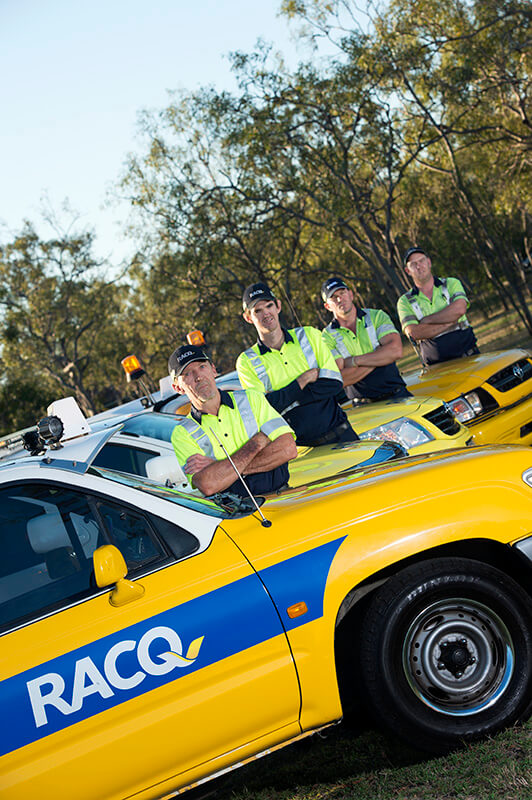
RACQ
Building Teams
As an organisation committed to the development of their people, RACQ had already invested in developing the capability of their executive teams, however, were searching for opportunities to enhance their offering. RACQ chose to partner with Shape Consulting to undertake the Nine Conversations in Leadership™ program for the Group Executive Team (the GEX). Nine Conversations in Leadership™ takes leaders through a series of nine four-hour conversations to assist them in connecting with leading organisations, leading other and leading themselves through the seven dimensions of leadership: vision, community, alignment, teams, developing individuals, energy and self. The purpose of each conversation is to share and learn from one another’s leadership challenges and successes and to co-create ideas and solutions from sharing collective wisdom.
The Nine Conversations in Leadership™ program delivers training in a workshop format, using 360° feedback, peer coaching, action learning projects and personal development planning to create strong, committed and aligned leaders at all levels of the organisation.
For RACQ, the initial objectives of the Nine Conversations program were to:
- Improve business awareness by aligning the key leaders with the company’s strategy and vision .
- Provide the participants with real project work that supports actual strategic initiatives.
- Build long lasting relationships through peer conversation and collaborative learning.
- Increase participant self-awareness of their current roles.
- Strengthen the leadership capabilities.
RACQ’s executive team commenced Nine Conversations in July, 2016 and completed the final conversation in September, 2017. Given the length of the program, new members of the executive team were onboarded at various intervals, taking the team from 9 to 12 members. To account for these changes, an additional conversation was added to the program, and content was tailored to ensure the program would deliver on its stated objectives.
Individual coaching sessions were also conducted between each workshop to support team members throughout the program.
Key Outcomes:
As a result of the program, the RACQ executive reported the following benefits:
- Greater alignment, supporting clarity of leadership messages throughout the organisation.
- A holistic and coordinated approach to identifying problems, devising solutions and adapting to change.
- Strengthened individual capabilities in approaches to management, leadership and leadership development.
- Improved relationships amongst the executive, supporting ongoing peer collaboration and learning.
In terms of tangible program artefacts, the executive team created a team charter, vision and purpose statement, as well as a leadership definition for the organisation. The executive developed individual and team action plans to identify how they could better lead themselves, their teams, and the organisation. These action plans included activities for improving effectiveness through performance management, time management, change management and detailed how leaders could adopt a coaching role to influence their teams.

CAPRAL ALUMINIUM
Nurturing Leadership
Publicly listed company, Capral Aluminium, is Australia’s largest extruder and distributor of aluminium products.
In 2017, the company was facing significant change at its Queensland manufacturing plant. To keep pace with intense competition from aluminium product importers, Capral decided to progressively upgrade its machinery and support its frontline leaders to enhance their job performance and satisfaction.
To develop its frontline leaders, Capral wanted to invest in a program that would provide tailored personal development opportunities for each leader while contributing to a collective boost in leadership capability and resilience at Capral.
Shape Consulting has worked with Capral Aluminium since 2012, providing a range of cultural change, leadership and team development initiatives.
In 2017, Shape Consulting was engaged to provide a leadership development solution for 40 frontline leaders in Queensland. After consultation with Capral’s Production Manager and program sponsor, it was agreed that the program should enable frontline leaders to:
- Be clear about their capabilities and Capral’s performance.
- Engage in self-reflection and build greater self-awareness of themselves and their impacts on others.
- Access practical strategies and techniques for how leaders manage themselves, engage with their teams and deliver outcomes.
- Better communicate and build stronger relationships with Capral colleagues.
Shape Consulting had to keep in mind that the program was for leaders who were shift workers (with different patterns of availability) and many had not previously participated in leadership training or development activities.
To address these requirements, the program that Shape Consulting developed featured a blend of delivery methods including:
- Individual competency and behavioural assessments including the Human Synergistics 360-degree assessment ‘the Life Styles Inventory’ and direct manager feedback.
- Individual coaching and goal-setting.
- Online learning modules developed specifically for Capral, delivered using a Learning Management System.
- Group workshops.
These methods were interwoven to ensure that participants could learn about, and apply, concepts in real-time.
The online learning modules were a significant component of the program. There were 18 competency-based modules which could be accessed at any time of day. This enabled learning to occur at each participant’s pace or around work shifts. A workbook was provided to promote individual reflection and reinforce learning. The modules covered competencies such as:
- Leading teams (understanding team dynamics and performance).
- Effective communication (understanding verbal and non-verbal communication styles to help lead others).
- Coaching as a leader (best practice for building a coaching approach with staff).
- Performance management (proactive conflict resolution and having honest conversations about performance).
- Leading and managing change (understanding the human side of change and how to create commitment and momentum).
- Influence and motivational needs (for creating high performance teams).
- Time management (focusing on outcomes through effective planning, task prioritisation and delegation strategies).
- Safety (from an individual, team and organisational perspective).
Concepts discussed in the modules were reinforced at full-day group workshops. At these events, Shape Consulting facilitated conversations, peer interactions and experiential learning activities to deepen participants’ understanding and practical application of leadership and business skills.
Participants also met with their Shape Consulting coach throughout the program to track progress towards their individual development goals.
Overall, the program delivered more than 700 hours of online learning, 156 coaching sessions and six full-day group workshops over nine months.
Key Outcomes:
Capral’s frontline leaders and the Queensland operation reported overwhelmingly positive results from Shape Consulting’s leadership development program. Post-program surveys revealed that managers had seen an improvement in the leadership ability and response to change by every participant.
All participants reported that the program had helped them to be more aware of the impact of their behaviour on others, display patience in difficult situations, respond more effectively to problems, and balance what was good for their work team with the needs of other parts of the organisation.
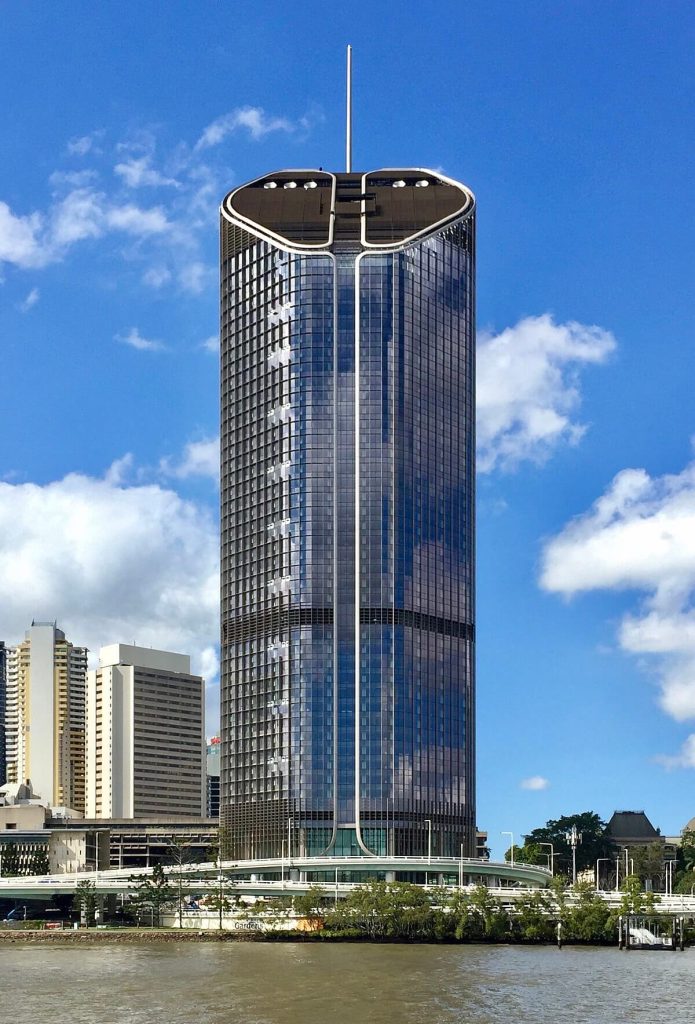
“We were a coalition; a team that transformed the public service working environment and many of its business processes. There was also sheer joy being part of this team; fun and challenging in equal measure. I liked that.”
The words of the 1WS Project Director describing the experience of partnering with Shape Consulting.
ONE WILLIAM STREET
Navigating change
One William Street (1WS) is the Queensland Government’s headquarters in the Brisbane CBD. It is a modern workplace which supports the efficient delivery of Queensland Government services through agency collaboration and technology. At 75,000m2, the building is one of the largest office premises in Queensland featuring 41 levels of open plan, activity-based workspace, business lounges, meeting and conference areas, a ground-level retail precinct and one of Australia’s largest end-of-trip facilities (for cycling and active travel).
All Queensland Government Ministers, most Directors-General and about 5,000 government employees from 9 whole agencies and 11-part agencies work together at 1WS.
Relocation to 1WS from 16 different CBD buildings involved Australia’s largest government integration program. This historic initiative was also the catalyst for delivering the most significant cultural and business change in the Government workplace in a generation. The aim was to ensure that the transition and all aspects of the Government’s new workplace realised the overall objectives of rejuvenating the public service and driving value for Queensland.
Shape Consulting provided strategic advice, planning, (change) management and stakeholder engagement services as an embedded part of Queensland Treasury’s project team.
Shape Consulting designed the 1WS transition program to reflect public service values such as ‘unleash potential’ and ‘empower people’ and to mirror the collaborative design of the new 1WS workplace.
An overarching transition strategy supported government agencies to change with their physical workplace and evolving government work practices. However, a ‘one size fits all’ methodology was not prescribed, and Shape Consulting worked with each transitioning agency to tailor the program to meet specific needs and contexts. This approach encouraged Ministers, Directors-General, agency leaders and staff to take ownership of the change within their agency, actively participating in meeting overarching objectives and contributing to the design of the 1WS workplace and its culture.
In summary, Shape Consulting’s key consulting activities involved:
- Researching and developing an integrated transition management and stakeholder engagement strategy.
- Supporting the Project Director to identify and manage risks to the transition process.
- Developing change management tools and processes for tenant agencies to deliver within their workplaces (such as adopting mobile working technologies and processes).
- Preparing and delivering regular stakeholder communications.
- Coordinating key change campaigns such as agency immersion in a 1WS pilot space (a mock-up of the 1WS workspace).
- Helping coordinate the six-week relocation.
- Measuring and monitoring the success of the transition and implementing improvements as needed.
Key Outcomes:
Shape Consulting supported the Queensland Government to make a smooth transition to 1WS, achieving:
- Increased collaboration: 84% of agency staff felt the 1WS work environment enabled them to interact face-to-face with team members.
- Enhanced productivity: As a result of the transition program, there was more than a 50% reduction in paper and stored materials across agencies, and 100% adoption of mobile working technologies. In addition, 75% of agency staff found that 1WS and mobile technologies enabled them to work in a variety of locations and 62% felt that 1WS was a productive place to work.
- Engagement: 97% of agency staff were aware of the 1WS transition project throughout the year before the relocation, while 85% felt prepared for the move six months beforehand.
- A healthy, flexible and technology enabled workspace: 93% of agency staff were satisfied with the new workplace at the time of relocation, and 80% remained satisfied after almost six months.



